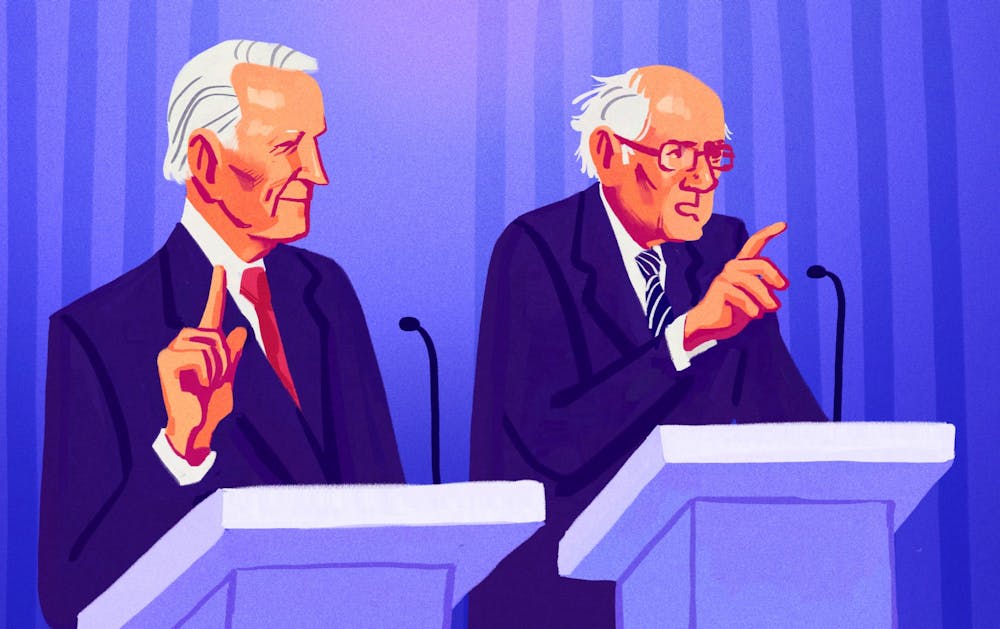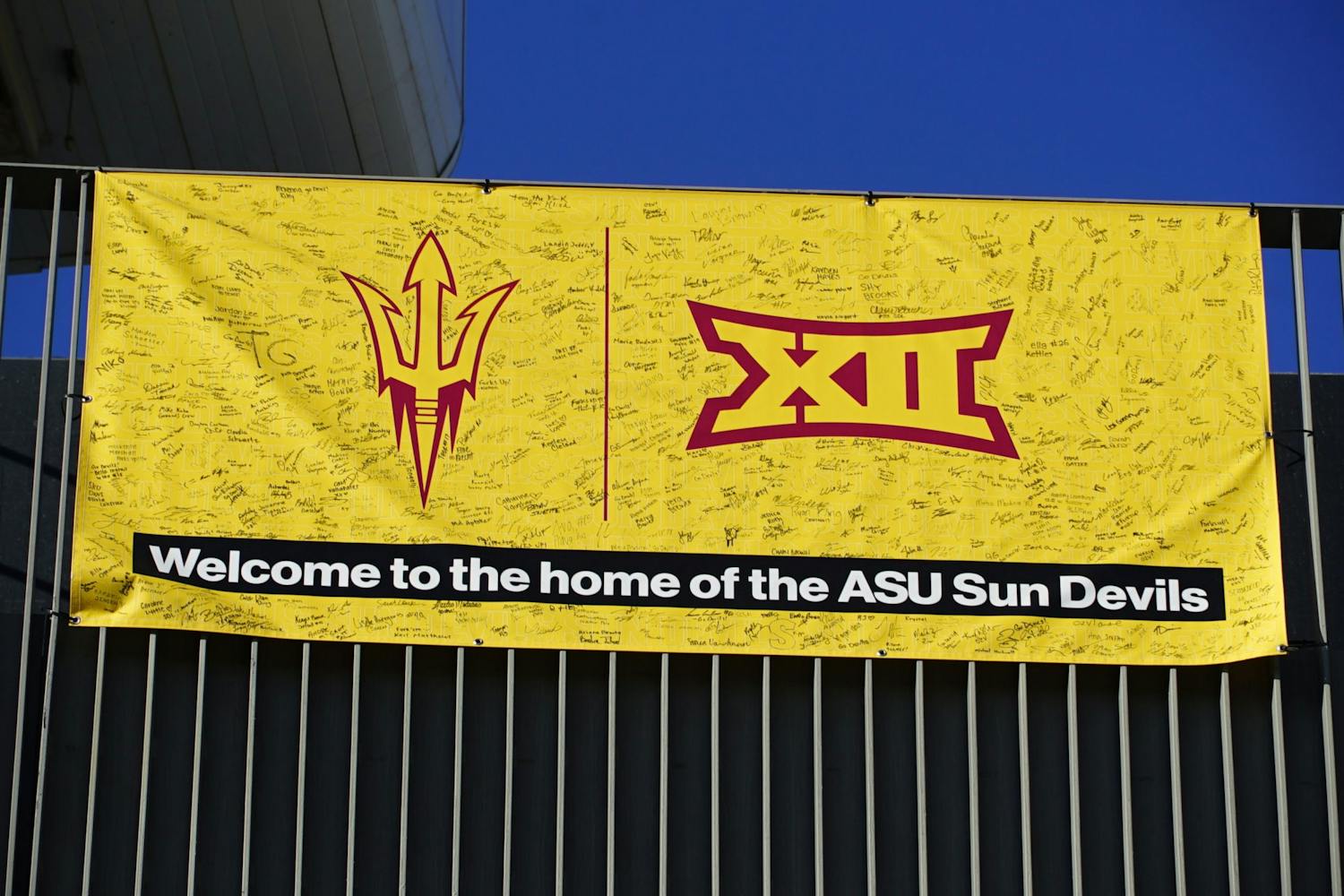While the Democratic debate is no longer coming to Phoenix, because the presidential preference election is just four days away, former Vice President Joe Biden's and Sen. Bernie Sanders' statements and televised riff-raff will be detrimental to how voters will cast their ballot Tuesday.
The debate was moved to a television studio in Washington, D.C., with no live audience or press filing center over concerns of COVID-19, or the new coronavirus, but ASU students will continue their watch parties as planned.
The Democratic National Committee partnered for the first time with CHC Bold, a political action committee affiliated with the Congressional Hispanic Caucus, to schedule and plan the debate, the 11th this election cycle.
Following losses in primaries in Idaho, Michigan, Missouri and Mississippi, Sanders said Wednesday that he would not suspend his campaign, rather would open five field offices in Arizona and was looking forward to his one-on-one debate with Biden.
Primary results in Washington have still not been called yet, but Biden is leading with almost 37% of the votes. Biden has 881 delegates and Sanders has 725.
What ASU students are doing
Clubs like ASU Young Democrats, Young Democratic Socialists of America at ASU and College Libertarians are still finalizing the details of watching the debate as a club.
Organizations, like the Young Democrats, are watching in Phoenix at a debate party with a virtual text banking event for nonprofit.
"There will still be a watch party at the Van Buren, but the partner event with Voto Latino is now a virtual text banking effort," said John Adamson, the club's social chair and a sophomore studying political science.
Club members will watch the debate Sunday and send Lyft codes to people so they can get to the polls on Tuesday.
Before the debate was moved, YDSA members had planned on attending, while College Libertarians said that they were not going and probably wouldn't watch the full debate, voicing their differing views from the Democratic party.
"I do believe Democrats and Libertarians share the same goals, but we have completely different ways of going about it," said David Howman, president of College Libertarians and a graduate student studying justice studies.
Due to the narrower field, Sanders and Biden will have more time to respond to questions, explain their ideas for possible change and debate with each other, something that students are hoping will happen.
Tanzil Chowdhury, YDSA chair and a senior studying materials science and engineering, said that some members of the club were signed up to go the debate, but the organization will not do anything as a group.
"Obviously this is becoming a two-person race," Chowdhury said. "We hope Bernie will go more on the offensive. There are serious, substantive policy differences between Bernie and Biden, and those should be drawn out."
About the debate
Even though the debate was moved, its initial placement in Phoenix was a testament to Arizona's possible distinction as a battleground state in this year's election, according to political pundits.
This debate comes just 10 days after Sanders rallied in Phoenix and a month after President Trump held a campaign event at the same venue.
In 2016, President Donald Trump won the state's 11 electoral votes by a 3.5% margin, but the election of Sen. Kyrsten Sinema, the first Democrat to take an open Senate seat since 1976, makes analysts unsure of how Arizonans will vote in November.
A week before the debate, the DNC required candidates to have at least 20% of available delegates, eliminating Rep. Tulsi Gabbard (D-Hawaii) from the debate stage after she won only two delegates on Super Tuesday.
Gabbard is still campaigning and even called on Sanders and Biden to discuss her participation in the debate with the DNC.
While an official list of topics has yet to be released, viewers will most likely hear about health care policies, foreign affairs and immigration. The candidates' age and mental well-being may also be discussed, as this past week, a former President Bill Clinton adviser said Biden should undergo a mental fitness test.
It also becomes increasingly clear that the two may talk about closing borders, schools and asking people to stay home from work during a pandemic, something that dominated headlines this week.
Students in the School of Politics and Global Studies were sent a link where they could submit questions. The form includes space for students to submit three questions to each candidate directly, and three that could be answered by either Sanders or Biden.
Along with the Arizona presidential preference election, primary elections in Florida, Illinois and Ohio will also take place on March 17.
Who's endorsed who
Vice President Joe Biden
- U.S. Sen. Kyrsten Sinema
- Congressional District 9 Rep. Greg Stanton
- Congressional District 7 Rep. Ruben Gallego
- Congressional District 2 Rep. Ann Kirkpatrick
- Arizona House Minority Leader Charlene Fernandez
- U.S. Senate candidate Mark Kelly
Sen. Bernie Sanders
- State District 26 Rep. Juan Mendez
- State District 29 Rep. Martin Quezada
Editor's Note: John Adamson is a former State Press employee. He had no involvement in the writing or editing of this article.
Reach the reporters at pjhanse1@asu.edu and follow @piperjhansen on Twitter.
Like The State Press on Facebook and follow @statepress on Twitter.

Piper Hansen is the digital editor-in-chief at The State Press, overseeing all digital content. Joining SP in Spring 2020, she has covered student government, housing and COVID-19. She has previously written about state politics for The Arizona Republic and the Arizona Capitol Times and covers social justice for Cronkite News.




